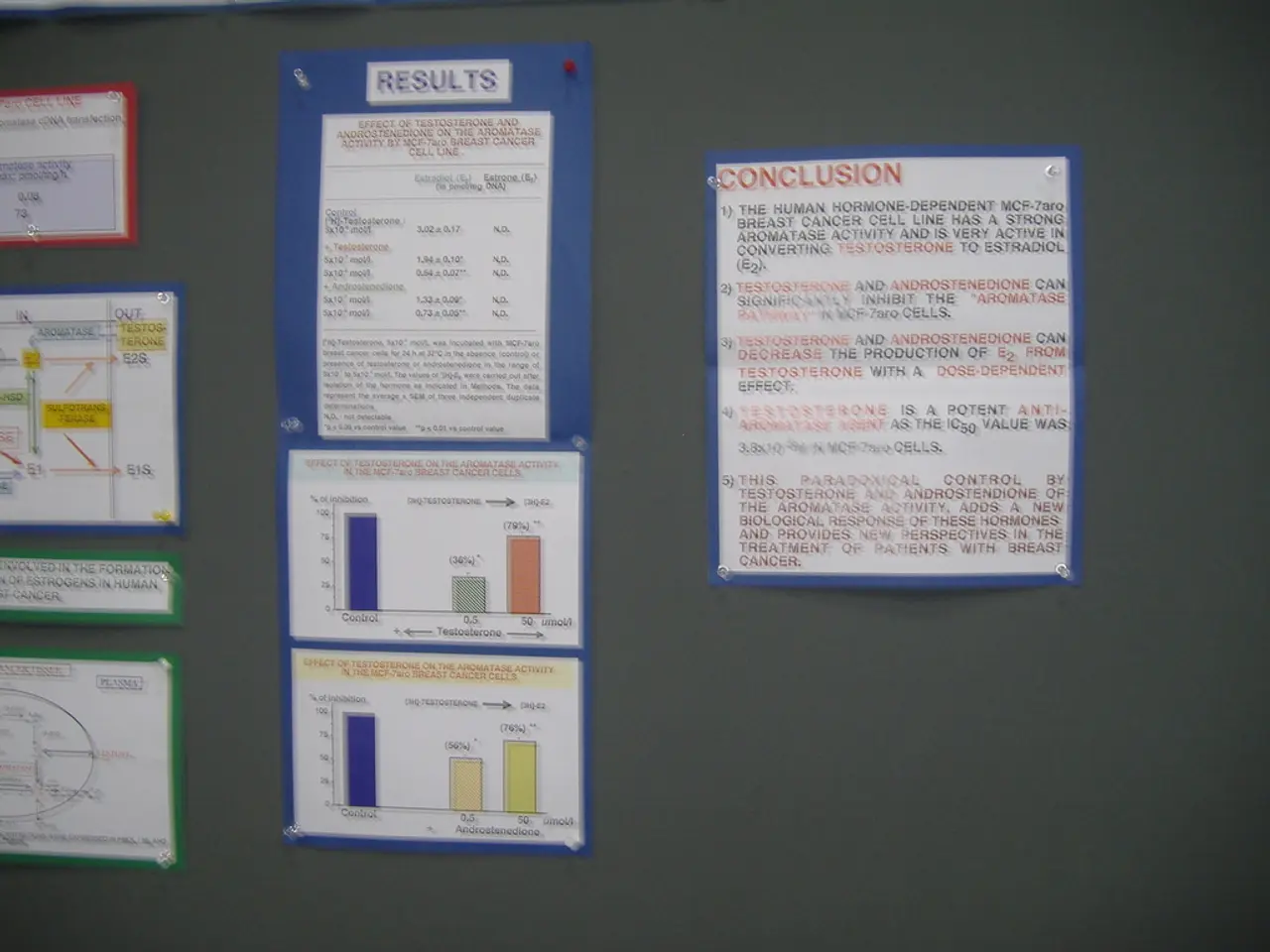The Great Push: Trump Squeezing Drug Prices to Benefit U.S. Consumers - European Pharma under Fire
- *
United States to Reduce Pharmaceutical Costs: Pressure Mounts on European Drug Markets - Trump advocates for reduced prescription drug prices in the US, potentially escalating economic pressure on European countries with strong pharmaceutical industries.
In a ruthless move, President Donald Trump is setting his sights on pharmaceutical companies and foreign governments, aiming to slash sky-high drug prices within the United States – and Europe is under heavy fire. "It's about time we stopped subsidizing other countries' healthcare," Trump declared while signing an executive order at the White House. Americans have been burdened with excessive drug costs for far too long, he asserted.
The success of Trump's new measures is still uncertain, given the potential for both political and legal backlash. Previously, the Republican had attempted to tackle high prices during his first term without success.
Trump slams Europe as "more disgraceful than China"
"I'm not making any grand accusations against pharmaceutical companies," Trump evaded. Instead, he lashed out at European countries, arguing that American patients have been contributing to the funding of "socialist healthcare systems" like Germany's. He accused the European Union of behaving "more disgracefully than China" in price negotiations. Europe will have to pay more in future, he claimed. "The rest of the world will have to pay more, and America will pay much less."
In Trump's executive order, he invokes the principle of "most favored nation," a strategy he had intended to introduce during his first term: American consumers should no longer pay more for certain drugs than the lowest-priced nation globally, regardless of market size or economic strength. "This game is over," Trump stated, aiming at countries that he believes have taken advantage of favorable conditions at the expense of the U.S.
Trump's Approach Increasing Pressure on Pharma
Trump's announcement is putting significant pressure on the pharmaceutical industry. "The U.S. is the most important market for innovative medicines," says Han Steutel, president of the Association of Research-Based Pharmaceutical Companies (VFA). "Without revenues in the U.S., research and development, and new therapies for European patients could often not be sustainable. What happens now in the U.S. has consequences for the entire world."
With an international reference to the lowest price, research costs could no longer be covered, and market introductions might increasingly be jeopardized, Steutel warned. A robust, coordinated EU drug policy within a strong, common EU market is now required, according to Steutel.
The consulting firm Simon-Kucher predicts extensive repercussions on the global pharmaceutical industry, including German companies. "A declining revenue situation could pose a threat to research, production, and jobs, including those at German sites," the company concluded in a study.
With a drop in U.S. sales, companies will likely face increased pressure to demand higher prices in other industrial nations like Germany. Pharmaceutical companies may also hold off or avoid entering the German or European market altogether to ensure their pricing in the U.S. remains intact, according to Simon-Kucher.
Agencies in Action
To implement Trump's decree, several U.S. agencies are set to be activated. The Department of Commerce is poised to act against foreign pricing policies deemed unfavorable according to U.S. standards, including state-controlled maximum prices that disadvantage U.S. companies. The Department of Health and Human Services will facilitate, wherever possible, direct sales of drugs to U.S. consumers at lower prices. The Food and Drug Administration will also examine whether imports from additional industrial countries can be permitted in the future. Export restrictions are also under discussion at the White House.
Within 30 days, the Department of Health and Human Services is to set concrete targets for price reductions. Based on this, the government will negotiate with the pharmaceutical industry. If the industry fails to lower prices voluntarily, further measures are planned.
The focus will be on drugs where price differences between U.S. and foreign markets are particularly substantial. No specific medications or product groups were initially mentioned, but Trump's statements indicate that this is not limited to certain drug categories.
A Mighty Lobby - Crossing Party Lines
Trump accused the pharmaceutical industry of possessing excessive political power. He characterized the lobby as "arguably the most powerful in the world" and claimed that Democrats had shielded the industry for years.
Indeed, the industry is one of the most influential in Washington. Targeted donations – to both Democrats and Republicans – ensure pharmaceutical companies have a voice in legislation. Reforms aimed at lowering drug prices face bipartisan resistance, often citing potential impacts on research and innovation.
The cost of medications is a persistent issue in the U.S. Unlike many other countries, there is no central state price regulation in the U.S. Price-setting is primarily left to pharmaceutical companies, leading to often significantly higher costs compared to European countries. In Germany, various forms of state control apply.
- Donald Trump
- USA
- Europe
- Pharmaceutical Industry
- Medicine
- Pharmaceutical Company
- U.S. President
- Germany
- Republicans
- China
- Drug Price
- EU
- Pharmaceutical Industry
- America
- HHS
Enrichment Data:
Implementing a policy where the USA pays no more for certain drugs than the country with the lowest price worldwide would have significant consequences for the global pharmaceutical industry and specific countries like Germany. Here are some potential impacts:
Global Pharmaceutical Industry
- Revenue Reduction: Pharmaceutical companies could face a decrease in revenue due to lower prices in the U.S., eventually impacting their ability to invest in research and development (R&D)[1][3].
- Price Convergence: The global pharmaceutical market might experience price convergence, where prices in other countries could rise to meet the U.S. prices, potentially increasing costs for consumers in countries with lower prices[1][3].
- Market Dynamics: The policy could disturb market dynamics, potentially leading to market distortions and affecting the availability of drugs in countries with lower prices if manufacturers are incentivized to prioritize higher-paying markets[4].
Specific Countries (e.g., Germany)
- Price Pressure: Countries like Germany could face increased pressure to maintain or adjust their pricing strategies to avoid being used as a reference point for lower prices elsewhere[1][3].
- Trade Relations: The policy could strain trade relations between the U.S. and other countries, including Germany, as it might be seen as an attempt to dictate global pricing practices[1][2].
- Healthcare Access: If Germany's prices are used as a reference point for lower prices, concerns about potential shortages or increased costs for drugs in Germany might arise if manufacturers are discouraged from offering drugs at lower prices in specific markets[3].
- The executive order signed by President Donald Trump targets sky-high drug prices within the United States, particularly focusing on European countries, as American patients have been subsidizing the healthcare of foreign individuals.
- Implementing a policy where the USA pays no more for certain drugs than the country with the lowest price worldwide would have significant consequences for the global pharmaceutical industry and specific countries like Germany, potentially leading to revenue reduction, price convergence, and market distortions.




